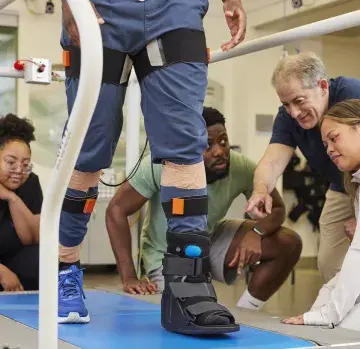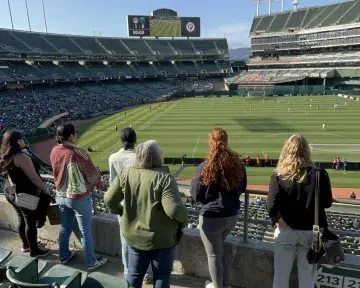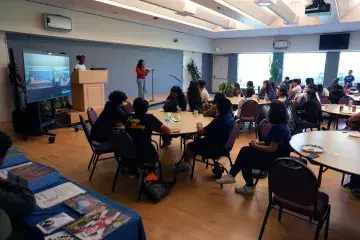Two SMU Students Prove Success of Pipeline Program for Disadvantaged Youth
 Demonstrating an early interest in math and science, Samuel Merritt University student Felicity Harris (pictured left) said she knew by the time she was in high school that she wanted a career in healthcare.
Demonstrating an early interest in math and science, Samuel Merritt University student Felicity Harris (pictured left) said she knew by the time she was in high school that she wanted a career in healthcare.
But as a kid growing up in various East Bay communities, and with little exposure to healthcare professionals to mentor her and few resources to support her new career interest, Harris had no idea which field to pursue.
That changed during an internship at Children’s Hospital in Oakland when she held the hands of cancer patients, observed surgeries, and worked in the hospital’s pulmonary department where she witnessed physician assistants in action.
“I liked the patient interaction and the connections the physician assistants were able to build with their patients,” said Harris, now a second-year student in SMU’s Master Physician Assistant (PA) Program.
Harris was the first student to attend SMU who had participated in FACES for the Future, a program that exposes disadvantaged high school students with an interest in healthcare to various medical fields. The students spend two years volunteering in local hospitals where they shadow medical professionals, rotating through specialties such as pediatrics and anesthesia.
Once she zeroed in on a career as a physician assistant, Harris said SMU was her top choice because she heard only positive reviews about the school when she reached out to local clinicians about PA programs.
“Physician assistants who graduated from Samuel Merritt have awesome reputations in the community,” she said. “All the feedback I received was that it was a top-notch school.”
 In 2013, Harris was featured in a segment on NBC Nightly News, during which she described how FACES helped to keep her motivated as a teenager despite an unstable home life.
In 2013, Harris was featured in a segment on NBC Nightly News, during which she described how FACES helped to keep her motivated as a teenager despite an unstable home life.
That kind of positive outcome was what pediatrician Tomás Magaña (pictured right from NBC News) hoped for when he co-founded the FACES program in Oakland 15 years ago. As a first-generation college student, Magaña said he wanted to provide young people with professional role models that he didn’t have growing up as the child of a single mom in East Los Angeles.
“If we’re going to talk about diversifying the workforce, we have to build these pathways and start at the high school level,” said Magaña, now an assistant professor and medical director in SMU’s Master Physician Assistant Program. “There are a multitude of barriers, particularly for a disadvantaged student.”
SMU, which also aims to educate students who will reflect the patient populations they will serve as healthcare practitioners, partnered with FACES in 2012 to host the first FACES Summer Medical Academy. The two-week academy, which took place this year July 6-17, provided hands-on learning to Bay Area high school youth interested in careers in medicine and the health professions. The students engaged in clinical skills training, anatomy workshops and patient simulation scenarios.
Aside from the experience gained in healthcare settings, FACES also offers life-skills training and academic support to encourage students to remain in school and pursue higher education. FACES programs have served more than 700 high school students in California, all of whom have graduated from high school. More than 90 percent have pursued a postsecondary education and many have pursued health-related careers.
 One of those is Sonam Chozom (pictured left), the second FACES alumna to become an SMU student. Chozom enrolled this year in the University’s Physical Therapy (PT) Program this year, 10 years after coming to the United States from India. She said she knew she was interested in healthcare even then, inspired by caring for her grandfather who had lost his eyesight as a young man while living as a nomad in Tibet without access to medical care.
One of those is Sonam Chozom (pictured left), the second FACES alumna to become an SMU student. Chozom enrolled this year in the University’s Physical Therapy (PT) Program this year, 10 years after coming to the United States from India. She said she knew she was interested in healthcare even then, inspired by caring for her grandfather who had lost his eyesight as a young man while living as a nomad in Tibet without access to medical care.
When Chozom learned about FACES as a high school junior, she applied and was accepted to the program and spent two years working at Oakland Children’s Hospital.
“It really opened my eyes, not only to the medical field but to how the United States opens opportunities to all kinds of people,” she said.
Chozom and Harris both say FACES offered them the support they needed to succeed while Dr. Magaña served as their role model, keeping in touch with them throughout their college years.
Harris said she hopes to work with FACES or create a similar pipeline program to encourage underrepresented students to enter healthcare. To further that goal, she earned a master’s in public health with a specialty in community health education before coming to SMU and has stayed involved with FACES over the past year by mentoring high school seniors in the after-school enrichment program.
“We capture those students who have an interest in healthcare and nurture that interest,” said Harris. “We also help them with their emotional well-being because high school can be such a challenging time.”
Magaña said that having two FACES students studying at SMU is proof that nurturing a passion for healthcare among young people through early exposure to career options is valuable.
“I feel an incredible amount of pride in their success,” Magaña said. “They’ve confronted significant challenges and put in a tremendous amount of work to actualize their dreams.”


